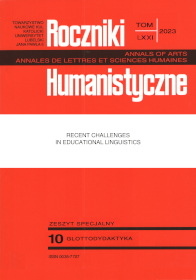Addressing Social-Emotional Learning Needs in Polish Tertiary Education: A Case Study of Reciprocal Peer Tutoring in Remote and Blended Learning Environments
Addressing Social-Emotional Learning Needs in Polish Tertiary Education: A Case Study of Reciprocal Peer Tutoring in Remote and Blended Learning Environments
Author(s): Monika Łodej, Sylwester ŁodejSubject(s): Language and Literature Studies, Applied Linguistics, Language acquisition
Published by: Towarzystwo Naukowe KUL & Katolicki Uniwersytet Lubelski Jana Pawła II
Keywords: reciprocal peer tutoring; remote learning; blended learning; social-emotional learning needs; tertiary education
Summary/Abstract: Until now, peer tutoring as an instructional strategy has not been widely endorsed at Polish universities. The relationship between peer tutoring and the affective domain of learning has received little or no attention. The period of emergency remote instruction triggered by the COVID-19 pandemic elevated the significance of social and emotional learning needs. The restoration of on-campus classes exemplified this need even stronger as students returned to classrooms being more socially and emotionally vulnerable than before. The present study contributes to the ongoing discussion over the significance of peer tutoring as a student-led instructional strategy that directly addresses students’ social-emotional learning needs. By comparing the effects of online reciprocal peer tutoring on English department students’ cognitive and social-emotional development under remote and blended course delivery, this study provides valuable insights into the benefits of reciprocal peer tutoring in different learning environments. The findings highlight the positive impact of online reciprocal peer tutoring on students’ emotions, motivation, self-efficacy, and knowledge gains, as well as the importance of peer support and collaborative learning in improving classroom dynamics and student involvement. These results suggest that reciprocal peer tutoring can be a valuable addition to university courses, especially in the current context of increased demand for online and blended learning opportunities.
Journal: Roczniki Humanistyczne
- Issue Year: 71/2023
- Issue No: 10S
- Page Range: 79-101
- Page Count: 23
- Language: English

